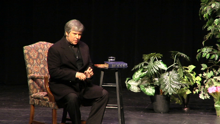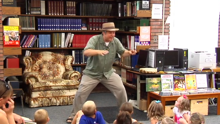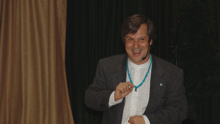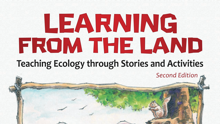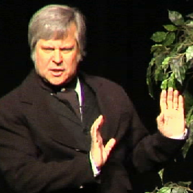 Mathias Stritt (1821-1888)
Mathias Stritt (1821-1888) In eighteen hundred and sixty one,
Huroo, Huroo,
That was when the war begun
Huroo, Huroo
In eighteen hundred sixty two
The grey coats fought the boys in blue
Oh my dear, who’ll shed a tear
when Johnny comes marching home
Huroo, Huroo,
That was when the war begun
Huroo, Huroo
In eighteen hundred sixty two
The grey coats fought the boys in blue
Oh my dear, who’ll shed a tear
when Johnny comes marching home
I remember well that morning, April 12, 1861, when General Beauregard fired his cannons on Fort Sumter. The roar of that cannon echoed from the bay of Charlestown across this country from the Alleghenies to the Rockies, and re-echoed around the world, drawing the eyes of tyrants who scoffed at our experiments in liberty and democracy.
Barely had that shot been fired at the foundations of freedom when we heard the call to arms from our immortal and matchless president, Abraham Lincoln. When he called for 75,000 men to protect the union, 150,000 stepped forward. When Father Abraham, as we were proud to call him, asked for 600,000 more, 1,000,000 responded. Eventually, an army of two and a half million men sprang out of the smoke and confusion, and hurried, not in vengeance against the enemy, but to save our union! We were met by 1,600,000 Americans, yes Americans, as brave and determined in the destruction of the Union as we were in its perpetuation, the mightiest armies that had ever confronted each other on a field of battle, one to re-unite and one to destroy the best government the sun shines upon.
I was one of the first to sign the roles and volunteer here in Peoria joining the 11th Calvary in this effort to save our nation. I, I am Mathias Stritt.
Though I was born in Wurttemberg, Germany in 1821, my family immigrated to Wisconsin in 1830. It did not take long for me to love this land and the opportunities it offered unknown to a German peasant farmer who still struggled under a baron, a minor king who treated his subjects as little more than cheap labor. When I was 40, I moved to Peoria to work for the Peoria Plow Works where my skills in steel work were highly valued.
It was then, in April 1861, that the war erupted. I heard the call. I enrolled.
What would cause a man to leave the luxuries of home for the fatigue of the march,
the family table of plenty for hardtack, pork and coffee,
the warmth of the hearth fire for the cold nights in the snowy mountains,
the easy bed for the bare earth, clean clothes for infested rags, the fireside for the battle field, love for hate, and life itself for the risk of death? Four years of relentless hate, organized rage, unabated anger, steady, unceasing systematic organizing and training of men to kill one another!
the family table of plenty for hardtack, pork and coffee,
the warmth of the hearth fire for the cold nights in the snowy mountains,
the easy bed for the bare earth, clean clothes for infested rags, the fireside for the battle field, love for hate, and life itself for the risk of death? Four years of relentless hate, organized rage, unabated anger, steady, unceasing systematic organizing and training of men to kill one another!
And as you may know, In the early days of the war it was not going well for the boys in blue. If the rebel forces would have continued their march at the first battle of Bull Run, they may have strutted right into Washington D.C. Tourists came out with picnic baskets to watch the battle from a distant hill. Soon they were over run. General Winfield Scott, though he had served his nation faithfully in the War with Mexico, he was too old to ride a horse, let alone lead men into battle. Eventually Lincoln gave command to McClellan. DO you know McClellan? If you do then you know he had seerrrriiiooos caaaaase of theee sloooows. Not once but twice he had a chance to capture Lee and end the war in the early days, but he let Lee slip away from his Grand Army of the Potomac.
It wasn’t until men from Illinois under General Grant and Logan’s Thirty First, later known as the Dirty-First because they never met a battle they backed away from. Though they were surrounded, outnumbered and eventually fell, they rallied the other troops and Grant took Fort Donaldson, our first real victory. Grant was one of the first generals to look beyond the battle field, to see the entire country as a chess board. Imagine now this entire country a chess board. The Northern States are blue, the Southern States are red, the border states, we are not sure which way they will go. Grant wisely saw that if he could send troops down the Mississippi River to win the Western Frontier and then split the south in half he could crush the enemy, but the price we paid… At Shiloh more than 23,000 killed, wounded, or missing in action. Grant lay in siege surrounding Natchez for more than a month, he starved them out, but his plan was working. Grant was winning.
The generals back east grew jealous of Grant and began spreading rumors about his love of the drink, which may not have been a rumor. When President Lincoln heard the slander he said, and this is a quote, “Find out what he is drinking and order a barrel for all of my generals, at least Grant is winning!”

In eighteen hundred sixty three,
Huroo, Huroo,
Lincoln set the coloreds free
Huroo, Huroo
In eighteen hundred sixty four
Lincoln called half-a-million more
Oh my dear, who’ll shed a tear
When Johnny comes marching home
Huroo, Huroo,
Lincoln set the coloreds free
Huroo, Huroo
In eighteen hundred sixty four
Lincoln called half-a-million more
Oh my dear, who’ll shed a tear
When Johnny comes marching home
Eventually, Grant was given the position of supreme commander. He threw everything he had at Lee. Did you know Robert E. Lee was professor at West Point the year Grant graduated at the top of the class? How well these men knew each other it is hard to say, but clearly they knew each others strategies. It quickly fell to a game of the devil’s arithmetic. The tragedy was unfathomable. We lost more men in three days at Gettysburg then the entire Vietnam War. The death counts of Chickamauga, Cold Mountain, the Wilderness Campaign... Sherman continued Grants Campaign in the West eventually burning Atlanta to the ground and Marching to the Sea, leaving a swath of destruction 100 miles wide and splitting the south in two. Some say Sherman’s slash and burn policy left scars in the south that have not yet healed.
With the Emancipation Proclamation, Lincoln set the coloreds free. Some say it was a political document that did very little to end slavery, it was filled with loopholes and compromises, only freeing the slaves in the south where Lincoln had no power. But I say it worked. I believe Lincoln never waffled on the issue of slavery, he did what he could when the time was right. Were any of you here in Peoria when delivered one of his most famous speeches on the Peoria Courthouse Square? A house divided against itself cannot stand.” Either we shall all be free or enslaved by slavery. The Emancipation did its job, it angered the south, robbed them of free labor, demoralized the Confederacy, and added thousands of men to the roles. And you have to agree the colored troops turned the tide, tipped the scales. These black troops were not fighting for some high minded ideal, for them slavery and the promise of freedom was real, palpable. The colored troops helped to win this war.
Finally, finally, Lee and Grant met at Appomattox and the war was over. There were still skirmishes for several weeks, but Lincoln spoke wisely of ‘malice towards none.’ If only he could have served out his second term, how the aftermath of the war would have been different, no one can say…
I, I was wounded in battle, but I was among the lucky, I returned home and my wounds healed. In the 11th Regiment of the Illinois Calvary 34 men were killed in action, but 245 died from disease and privation. These numbers were common, in most units disease, exposure to the elements, gangrene and starvation, killed more men than a musket ball. Let me tell you lest we forget, that of the 4,300,000 men who formed a long line of bloody battle, more than half-a-million lost their lives and another half-a-million came back maimed for life. More Americans died in this Un-Civil War than both World War I and II combined. And a million widows, mothers, sisters and sweethearts mourned for those who did not return. I tell you this, “Lest We Forget.”
But I was lucky, I returned to Peoria, to my loving wife and children, to my job at the Peoria Plow Works. Eventually, my lungs filled with emery dust from grinding steel. Consumption made breathing difficult. So, I took my meager savings and opened a pub in Averyville, not far below our beloved Soldier Hill.
After the war we veterans got together whenever we could, at local churches, saloons including the pub that I owned and we even met on street corners to talk about the war, sooth old wounds and bask in the glory. General John Logan, who became an esteemed Senator from Illinois after the war and was even courted for the White House, he was the first to promote the idea of a memorial day and later pushed through the legislation to make his idea a reality. He was also instrumental in establishing the veterans association known as the Grand Army of the Republic. I was also one of the first to sign up for this venerable organization here in Peoria. We founded the Bryner Post No. 67 of The Grand Army of the Republic giving us veterans a place to meet, play poker and share war stories and lick our wounds. Another veteran, John Benedict Greenhut, gave the majority of the money to build one of the best GAR halls in the state… it still stands down on Hamilton Blvd. Oh, the old cliché, if walls could talk, has never been more true than it is in the GAR Hall.
This evening, (afternoon), you will meet the Grand Army of the Republic, the brave boys in blue who made the ultimate sacrifice for the freedoms we enjoy. Listen well to their stories, lest we forget. Learn from the fatal errors of the past so they are not repeated, lest we forget. The banner they fought under still flies here over soldier hill. That banner is now carried by the proud sons and daughters of the Union Soldiers. Maybe you have an ancestor who fought alongside Grant or Sherman, Stonewall Jackson or Robert E. Lee, McClellan or Scott. Learn their stories and pass them on, tell them to your children and children’s children, lest we forget.
 In eighteen hundred and sixty five,
In eighteen hundred and sixty five,Huroo, Huroo,
That was when we ended strive
Huroo, Huroo
In eighteen hundred sixty five
We buried the dead, thanked God for our lives
Oh my dear, who’ll shed a tear
when Johnny comes marching home
©Brian “Fox” Ellis
This story was originally written for the 2006 Springdale Cemetery Tour. It has since been expanded and recorded on my CD Civil War Ghosts and Legends. The beginning and end is borrowed with permission from a wonderful collection of essays, “Lest We Forget.” I adapted a folksong as the chorus of the story. Students have my permission to learn and use this story for classroom performances.
This story was originally written for the 2006 Springdale Cemetery Tour. It has since been expanded and recorded on my CD Civil War Ghosts and Legends. The beginning and end is borrowed with permission from a wonderful collection of essays, “Lest We Forget.” I adapted a folksong as the chorus of the story. Students have my permission to learn and use this story for classroom performances.
